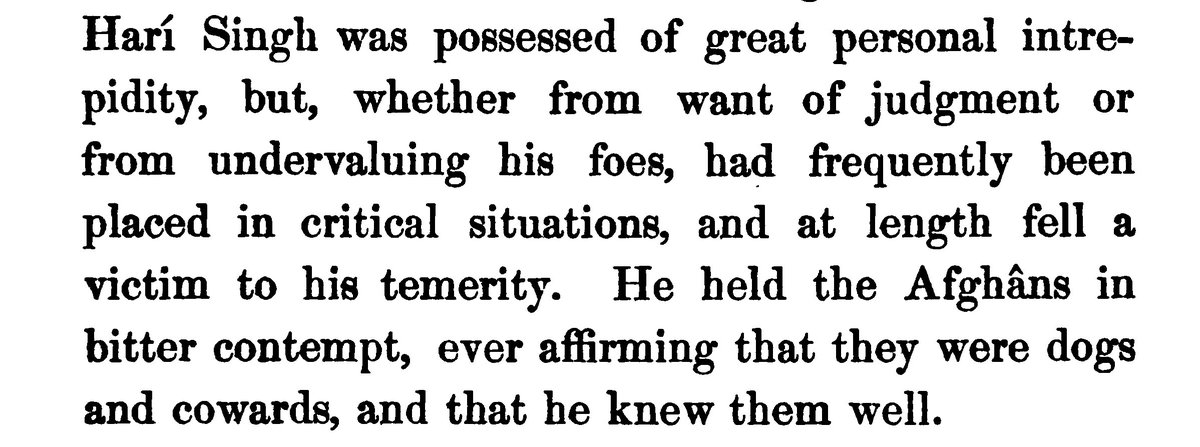His claim that Pashtun mothers were hushing their kids with the name of Hari Singh in Kohat as late as 1960s, is a big lie. Hari Singh neither governed Kohat nor he ever stepped foot on its soil. Autar Singh Sindhanwalia was sent to Kohat in 1834 and he governed it until it was restored to Sultan Muhammad Barakzai in 1836. (See Kohat Gazetteer (1883), p-30).
In his blog Salman Rashid writes;
"It was this man who had taken Punjabi arms across the Sindhu River and into the Pukhtun heartland. Such had been his terror that for nearly a hundred and fifty years after his death Pukhtun mothers were to restrain recalcitrant children with a whispered, ‘Chup Sha! Hari Singh raghle!’ (Be quiet! Hari Singh comes!). ⇑
Salman Rashid and his ethnic Kinsmen on other side of Wahga sees it as a "historical truth "and take the expression literally. But it is just a metaphorical expression, just like "the wolf drinking at the same fountain as the goat" or "the lion lying down with the lamb". You will find this expression of mothers hushing their children with names in literature all around the world; for example
"In Palestine, which was the scene of Richard's greatest deeds, his name became a terror to all for ages. The Saracen mothers would hush their children into silence by raising the threatening finger and whispering, "Be still, King Richard will come." [Romance of Biography, Illustrated in the Lives of Historic Personages, 1855, p-299]
"It is said that his character [ Sir John Talbot] became far and wide so formidable to the French, owing to the constant success which attended his expeditions, that mothers used to hush their children into silence by pronouncing the name of the "great Doggc Talbot" ["History of Cheadle, in Staffordshire, and Neighboring Places", 1885, p-202]
In fact it is also said that Indian mothers used to silence a crying child with the name of Pathan. You will find the usage of the same metaphorical expression 'XYZ raghlay' in a Mughal source, and Sikh historians (who were well versed in Mughal sources) most likely borrowed it from the Mughal source. Zakhiratul Khawanin, a biographical dictionary of Mughal nobility of early 17th century says that a Turkman Quje Ali terrorized Pashtuns of Sibi so much that their mothers used to utter "Qoje Ali raghle" to silence a crying child. He used to boil people alive and around one thousand people of that region were killed in such manner:
However, Quje Ali could not subdue the Panni tribe of Pashtuns through terror. He was perpetually engaged in wars with Panni Pashtuns until he was recalled to India. His successor, Shaikh Bol, was killed by Panni Pashtuns in 1617.
Salman Rashid is carried away by ethno-emotions when he gloats over Hari Singh by saying: "taking Punjabi arms across the Sindhu River and into the Pukhtun heartland". The fact is Hari Singh was a poor general and he jeopardized Sikh hold over Peshawar due to his recklessness. Charles Masson in 1840s writes:





No comments:
Post a Comment